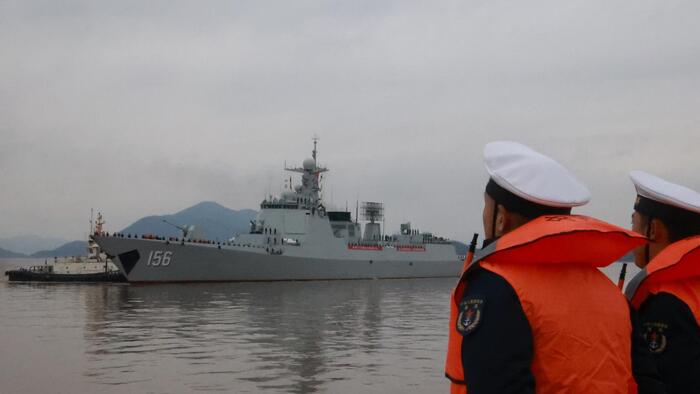In their analysis of Vice President Kamala Harris’s recent interview with Fox News’s Bret Baier, James E. Fanell and Bradley A. Thayer highlight significant deficiencies in her performance, especially regarding national security concerns facing the United States. Primarily, Harris’s focus on Iran was alarming, as she overlooked the more pressing global conflicts, notably the war in Ukraine and the existential threat posed by the Chinese Communist Party (CCP). Her failure to address the war in Ukraine — where over a million lives have been lost and the threat of nuclear conflict looms — is particularly concerning given the Biden administration’s substantial military and humanitarian support to Ukraine against Russia. Furthermore, Harris’s avoidance of any mention of the PRC indicates a lack of awareness or acknowledgment of the threat it poses not just to the United States but to its allies in Asia and beyond. This neglect is troubling, as it suggests a lack of strategic vision needed to navigate the increasingly complex global order.
Harris’s interview provided an opportunity to elucidate her understanding of significant geopolitical threats, yet her response reflected confusion, anger, and misdirection. While Iran is indeed a regional threat, it is dwarfed by the increasing aggressiveness of the CCP, particularly in the context of military operations and economic coercion against various nations, including Taiwan and allies such as Japan, the Philippines, and India. The aggressiveness of the PRC is not merely an abstract concern; it manifests through concrete military exercises and assertive territorial claims. Exercise Joint Sword 2024B, conducted by the People’s Liberation Army (PLA), serves as a stark reminder of the growing military capabilities and ambitions of China. This exercise involved extensive PLA operations encircling Taiwan, a strategic display of force that aimed at pressuring Taiwan’s leadership and signaling aggression to the international community.
The scale and sophistication of the PLA’s recent military activities reveal significant advancements in their capabilities. During Joint Sword 2024B, the PLA Navy’s first aircraft carrier, CNS Liaoning, executed an impressive number of sorties, indicating that its carrier aviation capabilities are rapidly improving and nearing those of the U.S. Navy. This acceleration in operational tempo — from 30 sorties a day to 140 in just two years — underscores a concerning strategic trend. The ongoing military developments are not limited to naval capabilities; there has been a marked increase in PLA incursions into Taiwan’s airspace, showcasing a systematic erosion of the status quo that had been maintained for decades. Such changes point toward a calculated effort by the CCP to normalize aggressive military postures in the Taiwan Strait, which could have dire implications for regional stability and international norms.
Moreover, the involvement of the Chinese Coast Guard in military exercises surrounding Taiwan is indicative of a broader strategy that integrates various state assets in pursuit of territorial ambitions. Reports of the Coast Guard’s participation signify a shift towards a “whole of government” approach by the CCP in asserting control over Taiwan, effectively demonstrating that the threats to U.S. interests are multifaceted and require a robust response. This encompassing strategy reflects the CCP’s declaration of a “People’s War” against perceived adversaries, reiterating a commitment to aggressive posturing and the necessity for a strong and coordinated American response in the face of these provocations. Notably, the apparent inaction from the Biden-Harris administration in response to these escalations reveals a significant gap in the current administration’s strategic planning and responsiveness to authoritarian aggression.
As the dynamics between the U.S. and the PRC evolve, it is essential for American leaders to grasp the extensive implications of Chinese military maneuvers and the broader geopolitical landscape. The CCP’s ambitions to establish naval dominance not just in Asia but globally are becoming increasingly evident. Meanwhile, the Biden-Harris administration has faced criticism for downsizing the U.S. Navy’s capabilities, raising questions about America’s readiness to counter such aggressive moves from China. Harris’s lack of acknowledgment regarding the CCP’s status as America’s foremost adversary during her interview suggests a dangerous disconnect from the reality of U.S. national security pressures, which could embolden adversaries and undermine deterrence.
American voters must recognize the critical importance of choosing leadership capable of addressing these geopolitical complexities with seriousness and strategic foresight. The current trajectory, if left unchallenged, risks leading the nation into a precarious situation where the geopolitical balance shifts unfavorably. Deterrence strategies are paramount; they rely on displaying strength as a means to prevent aggression. For the U.S. to maintain its global standing and security, it requires a leadership that comprehends the nuances of deterrence and can effectively counter the CCP’s aggression before it escalates into direct confrontations. The notion that weakness invites further aggressions must resonate in the electoral choices ahead, steering the nation toward a leadership that embodies the principles of strength and preparedness against an increasingly assertive China.
In conclusion, the analysis of Harris’s interview reveals a pressing need for American political leadership that is receptive to the nuances of national security and international relations. The failure to adequately address the existential threats posed by the CCP, coupled with a lack of strategic engagement in significant foreign conflicts like that of Ukraine, raises troubling concerns about her qualifications to assume the presidency. For America to defend its interests and maintain stability in the global arena, it must elect leaders with the capability to recognize and respond to threats effectively. The stakes are high, and the right leadership must prioritize national security, recognizing the necessity of a strong deterrent against the CCP’s aggressive international posture. More than ever, Americans must ensure that the values of strength and assertive diplomacy underpin future governmental efforts to safeguard the nation’s interests amid a rapidly changing geopolitical landscape.

